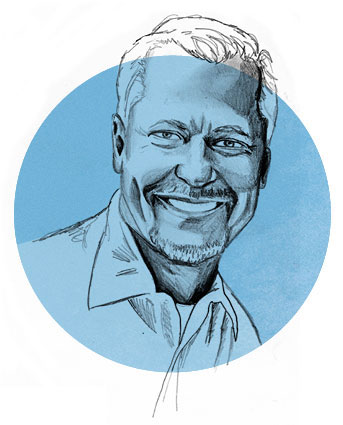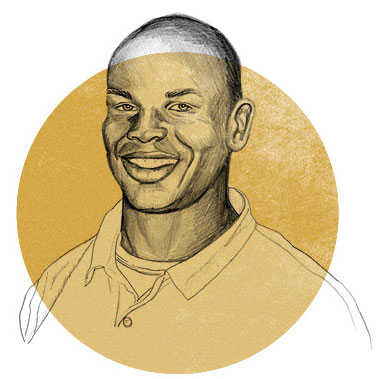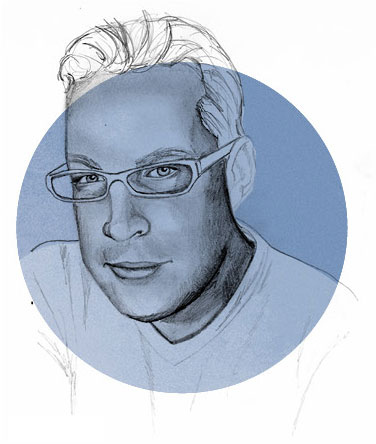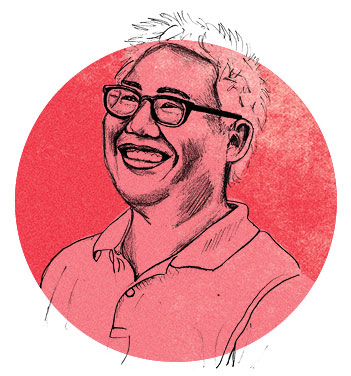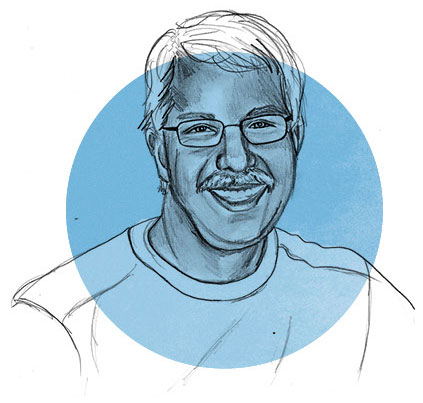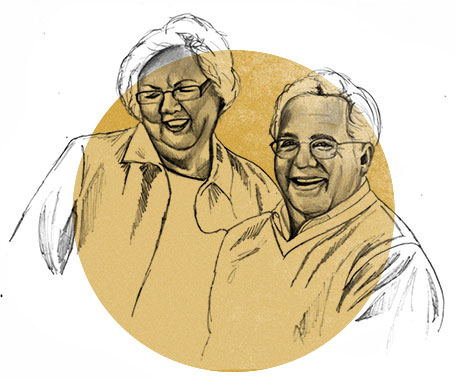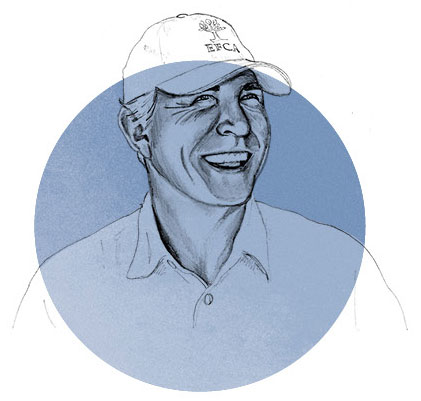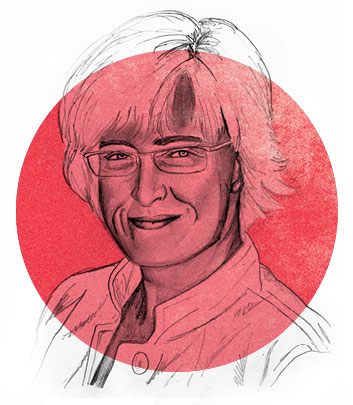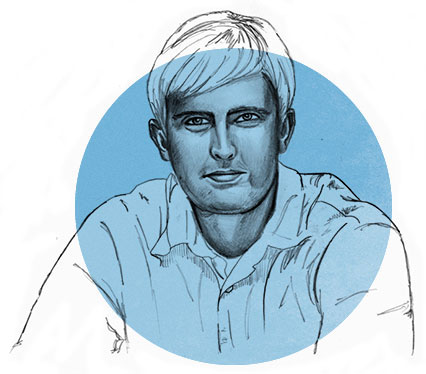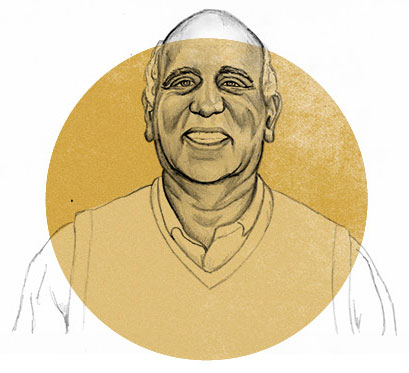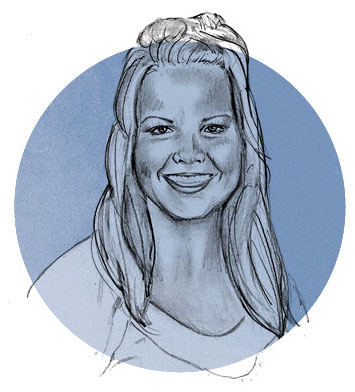What Drew You to the EFCA? What Keeps You?
EFCA leaders reflect on what tethers them to the movement.
Portraits by Lindsay Gilmore
Neal Brower
church-planting director, EFCA Midwest District
former pastor, Riverview Community Church (EFCA) in Ashland, Neb.
34 years in leadership with the EFCA
I stay in the EFCA because of loyalty, freedom and the gospel.
Loyalty. I started as a 3-year-old when my Presbyterian mother got fed up with her minister using Ladies Home Journal instead of the Bible. She asked my agnostic father to choose the next church in an effort to keep him spiritually engaged, and he chose, in 1960, First EFC of Fullerton, Calif. It was a church plant in a living room. Chuck Swindoll came to my church when I was in 8th grade and baptized me at age 16. I took sermon notes from the front row and could see my reflection in the black grand piano.
When I ran away to college, I tried to get away from God but couldn’t do it—I ended up at Kearney (Neb.) EFC. After I graduated I went to Trinity Evangelical Divinity School. I then went on to serve four EFCA churches over the next 27 years. As long as my EFCA family will keep me, I will serve God with them.
Freedom. There are a couple of traditions I think need to change, but even those are adaptable. That’s what I love about us: We are basic, sleek and gracious. Free to operate in the unique kingdom vision that most of us have. Yet our freedom can be our strength and our downfall. We are free to lack demonstrated commitment (yes, I mean financially) to our association. I would love to change that. I’m also concerned that this same freedom has resulted in a loss of focus. We are less than compelled for the perishing, which leads me to. . . .
Gospel. We have maintained our faithfulness to the true gospel, but I just wish that we’d all simplify for its sake. Pray for its sake. Live for its sake. I wish we’d believe, as Paul told the people living in Colossae, that very same gospel is “constantly bearing fruit.” What if each one would reach one every year? I want to offer anything I can to help the EFCA transition into a simpler, more focused, less top-heavy approach to helping people find Jesus.
I am waiting for the Holy Spirit to choose us, the EFCA, for genuine awakening in North America. I believe it is coming.
Philip Abode
pastor, Crossover Bible Church in Tulsa, Okla.
7 years in leadership with the EFCA
My co-pastor and I were first drawn to the EFCA because of the opportunity to be part of a denomination with other like-minded African-American pastors, and for the training and coaching we would receive as church planters.
During the first three years, it is safe to say that I took for granted being part of the EFCA. That all changed on our third anniversary, when our lead pastor unexpectedly stepped down from ministry and left the church. Crossover would not have made it through the transition if not for our brothers and sisters in the EFCA.
Our district superintendent, my church-planting coach and the head of the African-American Fellowship each personally helped us get through the toughest season of our young church’s life. Our superintendent always says that we are better together, and I experienced that firsthand.
I know that we will face other trials as a church, and knowing that we will not have to face them alone makes all the difference in the world.
Foye Belyea
lead pastor, Mountainview EFC in Voorheesville, N.Y.
1 ½ years in leadership with the EFCA
There were no EFCA churches anywhere near the small town of North Stonington, Conn., where I grew up. Over the years, though, I began meeting and being impressed by leaders and members of various EFCA churches, and I kept in touch with many as I served in the pastorate myself.
In 2010, when I was looking to transition into a ministry context that would be more missionally focused, one of those friends introduced me to Ves Sheely, superintendent of the EFCA’s New England District Association.
I recognized a kindred spirit in Ves immediately. We both desire to move beyond the modern programmatic model and return to a New Testament priority of making disciples. Soon afterward, I assumed the lead-pastor role at Mountainview EFC.
Ves kept introducing me to others, who introduced me to still others in the EFCA. These leaders are committed to the sufficiency of the Word but also recognize our desperate need—a need to practice listening prayer so that we may do all that our Sovereign Lord has purposed in this generation.
Each whirlwind step in this journey established new friendships and also granted me additional confidence that I had at last had found a home where I could minister out of all the fullness granted me by the Holy Spirit.
Perhaps the culminating event in my assimilation into the EFCA came to pass when I met key leaders within the Missional Architect community. These men are Holy Ghost-given confirmation that I am not crazy, that there are other young leaders in the Church today who want to spend their whole lives “ministering to and living among the barbarians,” just as passionately as I do.
What drew me into the life and mission of this Jesus movement that I have recently joined and grown to love? In a nutshell, I would call it a long journey coming home.
David Park
lead pastor, Open Table Community (EFCA) in Chamblee, Ga.
Member, Samaritan Way leadership team
1 ½ years in leadership with the EFCA
To be honest, I had never heard of the EFCA before 2007. I am the son of a Korean immigrant pastor ordained in the Southern Baptist Convention and who later served in the United Methodist Church. When I experienced a prodigal season in college, I was drawn back in through a charismatic church, then served in a Presbyterian church and studied in a PCUSA seminary.
It was when I claimed post-denominationalism that I discovered the EFCA, drawn to the EFCA leaders I had met, their sincerity and their potential for change.
I know people talk about change all the time, but in the Southeast District, the pastors talked “mission” through the lens of race, class and community. Now that was change I could get on board with. They were good people with a heart for the Word and for the church and were asking all the right questions: How do we become diverse without diversity becoming an idol? How do we do social justice and not make the Word irrelevant?
Granted, I still bristle at some of the “old school” mentality in our movement. And yes, at times, the Midwestern whiteness of the EFCA makes it feel like too much of a club—where I feel like a novelty more than a true partner. But the EFCA has great substance and a gravity that makes its rhetoric credible.
The EFCA doesn’t just hope for change to happen; they are willing to take risks and follow through on their Statement of Faith.
I appreciate that type of integrity. I appreciate when change is managed well and with a sincere heart to keep the different parts of the body unified under the head that is Jesus Christ. That’s what keeps me in the EFCA.
Dennis Hesselbarth
pastor, Hilltop Urban EFC in Wichita, Kan.
24 years in leadership with the EFCA
The year was 1988. The event: the EFCA National Conference in Fullerton, Calif.
A groundswell of concern about combatting evolution culminated in a floor motion that the EFCA conference formally endorse a literal, six-day creation. Speaker after speaker rose to support the motion, and a smattering opposed. Then current president Thomas McDill rose to speak.
He acknowledged that likely a strong majority of those present supported the motion. But, he added, our EFCA heritage and conviction is that “in essentials, unity, in nonessentials, liberty; in all things, charity.” This motion, he argued, is not an essential. To pass this motion would be to exclude those who disagree, and that is not what we stand for in the EFCA. We must agree to disagree with one another, in a spirit of respect and love. So this motion should be defeated.
And he sat down.
Case closed. The vote soon followed, and the motion was soundly defeated.
Wow. I was new to the EFCA, attracted much in part because of the liberty to disagree in nonessentials, yet always grounded in the Word of God (“Where stands it written?”). I had wondered, Does the Free Church really live up to its slogan about unity and liberty?
I found out that day: The Free Church means it. I felt at home.
Lee and Jerrianne Iseley
volunteers with Interim Pastor Ministries
members, Wheaton (Ill.) EFC
23 years in leadership with the EFCA
During the 1980s we met an EFCA district superintendent in Huntsville, Ala. He challenged us to consider the Evangelical Free Church of America. One of the appealing aspects of the EFCA then was the goal to establish local churches. Back then we had about 1,250 churches, and the goal was “2,000 by 2000.” Although we did not realize that goal by the year 2000, that church-planting commitment was like a magnet that drew our hearts to the EFCA.
Over the years we’ve helped start two EFCA churches and served in four others. When we lived in Philadelphia, I, Lee, had the opportunity to serve as interim pastor of a small independent community church. I challenged the church to join the EFCA. They did when the new pastor was called, and we joined that church.
We continue to be impressed with the commitment of the EFCA to carry out the Great Commission in communities by establishing and strengthening local congregations.
Steve Highfill
regional director, EFCA West
member, North Coast Church (EFCA) in Vista, Calif.
38 years in leadership with the EFCA
I frequently tell people that I would make my choice of the EFCA again today. Reasons? I have four:
1. It remains Great Commission-minded (think big) and teachable. I think back to the mid-’90s, when there was mounting evidence that membership in mainline denominations was showing vertical downward trends, and denominational leaders had shifted their mentality to thinking that the churches existed for them, not the other way around.
Our EFCA leaders heard and heeded the warning and determined that the local church is what matters; it is the centerpiece of God’s strategy to fulfill the Great Commission. The fact that the leadership of this movement responded so humbly and obediently to the Lord’s signals made this, to me, a very attractive community of fellow servants to identify with.
2. If the EFCA had not genuinely shifted from being a Scandinavian movement to a much more diversified group, I wouldn’t be here. Although Caucasian, I felt enough ostracism from some old-timer Norskies and Swedes that I wouldn’t have stuck around. We have a long way to go, and my heart goes out to our ethnic minority brethren, but I admire them for their patience.
3. The size of the EFCA is ideal, in my opinion. It is large enough to think and act on a global scale, yet small enough that personal relationships are possible—from the president’s office to the newest church plant.
4. And of course, the theological spectrum held by the EFCA is ideally suited to my own preference: tenaciously orthodox, yet focused on a few nonnegotiables rather than a hundred secondary distinctives. I love a recent phrase I’ve heard: The EFCA is the radical middle.
Laurie Lind
EFCA hospital chaplain
member of Shiloh EFC in West Fargo, N.D.
25 years in leadership with the EFCA
I was spiritually re-born at an EFCA church in 1969, as a third grader, and have been involved in EFCs wherever I have lived since. Then in the late 1980s, I was commissioned as a career EFCA missionary and served 11 years in Europe. I’ve been an active member of Shiloh EFC since the early 2000s and am currently pursuing an EFCA ministry license in connection with my part-time work as a hospital chaplain.
I feel as Evangelically Free as a person can possibly be.
Why do I stay with this denomination?
First, because I love what brought this denomination into existence. The phrase “where stands it written1,” so central to the thinking of the Scandinavians who founded the EFCA, rings true to my heart.
Second, because I appreciate the EFCA’s determination to major on the majors and not quibble over the minors. I realize that what constitutes a “major” or a “minor” is up for discussion in many circles. But in the EFCA, there is room and opportunity to fellowship with those who are fervently Calvinistic or Arminian, dispensational or covenantal, sprinklers or dunkers.
Third, because as Tevye so plaintively states about his hometown at the beginning of Fiddler on the Roof, I stay because the Evangelical Free Church “is my home.” For 42 years, my church home, my spiritual family, the very definition of my spiritual life, has been centered on the Bible and in the Evangelical Free Church.
I believe God is at work, mightily, in many other churches in my town, across the United States and around the world. When we all worship before Jesus’ glorious throne in heaven, it won’t matter one iota which church we frequented while on earth. But while we’re here, I’m grateful to continue to learn about, worship and serve our precious Lord Jesus from the home base of my Evangelical Free Church. As long as we adhere to “where stands it written,” I’m in.
1 “Where stands it written?” was a rallying cry of many believers in the Lutheran church of Sweden, Norway and Denmark in the mid-1800s, as they protested the dominance of state government in the church. They sought to practice their faith based only on the Word of God, rather than on tradition. The question became foundational for the early EFCA as well.
Ben Johnson
assistant coordinator, Immigrant Hope
attending First EFC in Brooklyn, N.Y.
3 ½ years in leadership with the EFCA
I mostly grew up in EFCA churches; my dad was an EFCA pastor for 13 years and went on staff with the Eastern District while I was in college. I had no problem with the EFCA, but I knew little about the denomination and did not feel any strong connection.
I decided to join the EFCA to work with the Immigrant Hope program, which I saw as a creative, proactive and uniquely Christian response to a social crisis. I expected Immigrant Hope to be a token side-project, constantly on thin ice and fighting for its life against strong opposition within the denomination. Instead, I found my passions matched, explored, refined and applied at nearly every level of the EFCA, from President Hamel to local pastors.
I have also discovered a number of other EFCA programs and affiliates that fit into the bigger picture of an outwardly focused church that’s holistically reconciling all people to each other and to God.
The reason I am still with the EFCA, and am likely to stay for a long time, is that this denomination is doing the work that I want to be part of. I have a passion for seeing the church sacrificially and compassionately insert itself into broken, sinful, seemingly intractable situations and transform them through the power of the gospel.
I don’t want to undersell the importance of the EFCA’s strong, orthodox doctrine; it empowers and protects everything else. That said, I think complete, sound doctrine produces love in action and in truth, not just words or speech. I care deeply about the core theology and mission of the EFCA, but I am with you because you are living out that core theology and mission in tangible, world-changing ways.
Luis Martinez
multicultural director for the Central District
member, Samaritan Way leadership team
member, Nueva Esperanza EFC in Iowa Falls, Iowa
32 years in leadership with the EFCA
As a Talbot Seminary student in the late ’70s, I inquired about the EFCA and found out that, as a Puerto Rican, I would be the minority. But I was encouraged by the EFCA doctrinal position and its openness to include people of all cultures and languages. I was eager to help bridge the gap between Anglos and Hispanics.
After graduating from Talbot, I was called to my first pastorate—a Hispanic EFCA church in Madera, Calif. Since then, my wife, Susan, and I have each experienced encouragement, acceptance and joy in serving in five different pastorates, both Spanish and Anglo.
I received the award of “bridge-builder” for the movement, which confirmed who I am in Christ. Now, we are encouraging leaders and churches from other ethnic heritages to join our movement. It has been a good and growing journey.
Ruth Arnold
director of 2nd Mile Ministries in Jacksonville, Fla.
member, Eastside Community Church (EFCA) in Jacksonville, Fla.
9 years in leadership with the EFCA
I first came to the EFCA “by default.” After college, my home church didn’t exist any more, so I joined my parents at their EFCA church while I sought to discern where God was leading me. At that point I considered the EFCA to be an evangelical association that was just as good as any other. Over the years, however, that has changed. Now, it would take a clear call from God to move me away.
What changed? What keeps me here?
As I got to know various district and national leaders, I realized I’d found a group of faithful, courageous, wise and prophetic God-followers. Things “on the ground level” are not always encouraging. However, I trust the heart, character and journey of our leadership.
In particular, I love being part of an association that embraces loving God with all their heart as well as loving their neighbors as themselves. I love that we are committed to “all people” standing around the throne of God in worship. I love that our national leadership has made key systemic decisions in hiring minority leaders in strategic and influential positions.
I love that the EFCA is committed to strong, sound, theological, biblical and gospel rootedness and has also made some risky decisions to stand for “the least of these.”
Finally, I am humbled and grateful that many key leaders have put wind in my sails and given me, as a female leader, space to use the gifts God has given me.
So while I started with this movement by default, I am fully committed to walking with this movement for years to come.
What Drew You to the EFCA? What Keeps You?
Neal Brower
- Church-planting Director, Efca Midwest District
- Former Pastor, Riverview Community Church (efca) In Ashland, Neb.
- 34 Years In Leadership With The Efca
I STAY IN THE EFCA because of loyalty, freedom and the gospel.
Loyalty. I started as a 3-year-old when my Presbyterian mother got fed up with her minister using Ladies Home Journal instead of the Bible. She asked my agnostic father to choose the next church in an effort to keep him spiritually engaged, and he chose, in 1960, First EFC of Fullerton, Calif. It was a church plant in a living room. Chuck Swindoll came to my church when I was in 8th grade and baptized me at age 16. I took sermon notes from the front row and could see my reflection in the black grand piano.
When I ran away to college, I tried to get away from God but couldn’t do it—I ended up at Kearney (Neb.) EFC. After I graduated I went to Trinity Evangelical Divinity School. I then went on to serve four EFCA churches over the next 27 years. As long as my EFCA family will keep me, I will serve God with them.
Freedom. There are a couple of traditions I think need to change, but even those are adaptable. That’s what I love about us: We are basic, sleek and gracious. Free to operate in the unique kingdom vision that most of us have. Yet our freedom can be our strength and our downfall. We are free to lack demonstrated commitment (yes, I mean financially) to our association. I would love to change that. I’m also concerned that this same freedom has resulted in a loss of focus. We are less than compelled for the perishing, which leads me to… .
Gospel. We have maintained our faithfulness to the true gospel, but I just wish that we’d all simplify for its sake. Pray for its sake. Live for its sake. I wish we’d believe, as Paul told the people living in Colossae, that very same gospel is “constantly bearing fruit.” What if each one would reach one every year? I want to offer anything I can to help the EFCA transition into a simpler, more focused, less top-heavy approach to helping people find Jesus.
I am waiting for the Holy Spirit to choose us, the EFCA, for genuine awakening in North America. I believe it is coming.
Philip Abode
- Pastor, Crossover Bible Church In Tulsa, Okla.
- 7 Years In Leadership With The Efca
MY CO-PASTOR AND I were first drawn to the EFCA because of the opportunity to be part of a denomination with other like-minded African-American pastors, and for the training and coaching we would receive as church planters.
During the first three years, it is safe to say that I took for granted being part of the EFCA. That all changed on our third anniversary, when our lead pastor unexpectedly stepped down from ministry and left the church. Crossover would not have made it through the transition if not for our brothers and sisters in the EFCA.
Our district superintendent, my church-planting coach and the head of the African-American Fellowship each personally helped us get through the toughest season of our young church’s life. Our superintendent always says that we are better together, and I experienced that firsthand.
I know that we will face other trials as a church, and knowing that we will not have to face them alone makes all the difference in the world.
Foye Belyea
- Lead Pastor, Mountainview Efc In Voorheesville, N.y.
- 1 ½ Years In Leadership With The Efca
THERE WERE NO EFCA CHURCHES anywhere near the small town of North Stonington, Conn., where I grew up. Over the years, though, I began meeting and being impressed by leaders and members of various EFCA churches, and I kept in touch with many as I served in the pastorate myself.
In 2010, when I was looking to transition into a ministry context that would be more missionally focused, one of those friends introduced me to Ves Sheely, superintendent of the EFCA’s New England District Association.
I recognized a kindred spirit in Ves immediately. We both desire to move beyond the modern programmatic model and return to a New Testament priority of making disciples. Soon afterward, I assumed the lead-pastor role at Mountainview EFC.
Ves kept introducing me to others, who introduced me to still others in the EFCA. These leaders are committed to the sufficiency of the Word but also recognize our desperate need—a need to practice listening prayer so that we may do all that our Sovereign Lord has purposed in this generation.
Each whirlwind step in this journey established new friendships and also granted me additional confidence that I had at last had found a home where I could minister out of all the fullness granted me by the Holy Spirit.
Perhaps the culminating event in my assimilation into the EFCA came to pass when I met key leaders within the Missional Architect community. These men are Holy Ghost-given confirmation that I am not crazy, that there are other young leaders in the Church today who want to spend their whole lives “ministering to and living among the barbarians,” just as passionately as I do.
What drew me into the life and mission of this Jesus movement that I have recently joined and grown to love? In a nutshell, I would call it a long journey coming home.
David Park
- Lead Pastor, Open Table Community (efca) In Chamblee, Ga.
- Member, Samaritan Way Leadership Team
- 1 ½ Years In Leadership With The Efca
TO BE HONEST, I had never heard of the EFCA before 2007. I am the son of a Korean immigrant pastor ordained in the Southern Baptist Convention and who later served in the United Methodist Church. When I experienced a prodigal season in college, I was drawn back in through a charismatic church, then served in a Presbyterian church and studied in a PCUSA seminary.
It was when I claimed post-denominationalism that I discovered the EFCA, drawn to the EFCA leaders I had met, their sincerity and their potential for change.
I know people talk about change all the time, but in the Southeast District, the pastors talked “mission” through the lens of race, class and community. Now that was change I could get on board with. They were good people with a heart for the Word and for the church and were asking all the right questions: How do we become diverse without diversity becoming an idol? How do we do social justice and not make the Word irrelevant?
Granted, I still bristle at some of the “old school” mentality in our movement. And yes, at times, the Midwestern whiteness of the EFCA makes it feel like too much of a club—where I feel like a novelty more than a true partner. But the EFCA has great substance and a gravity that makes its rhetoric credible.
The EFCA doesn’t just hope for change to happen; they are willing to take risks and follow through on their Statement of Faith.
I appreciate that type of integrity. I appreciate when change is managed well and with a sincere heart to keep the different parts of the body unified under the head that is Jesus Christ. That’s what keeps me in the EFCA.
Dennis Hesselbarth
- PASTOR, HILLTOP URBAN EFC IN WICHITA, KAN.
- 24 YEARS IN LEADERSHIP WITH THE EFCA
THE YEAR WAS 1988. The event: the EFCA National Conference in Fullerton, Calif.
A groundswell of concern about combatting evolution culminated in a floor motion that the EFCA conference formally endorse a literal, six-day creation. Speaker after speaker rose to support the motion, and a smattering opposed. Then current president Thomas McDill rose to speak.
He acknowledged that likely a strong majority of those present supported the motion. But, he added, our EFCA heritage and conviction is that “in essentials, unity, in nonessentials, liberty; in all things, charity.” This motion, he argued, is not an essential. To pass this motion would be to exclude those who disagree, and that is not what we stand for in the EFCA. We must agree to disagree with one another, in a spirit of respect and love. So this motion should be defeated.
And he sat down.
Case closed. The vote soon followed, and the motion was soundly defeated.
Wow. I was new to the EFCA, attracted much in part because of the liberty to disagree in nonessentials, yet always grounded in the Word of God (“Where stands it written?”). I had wondered, Does the Free Church really live up to its slogan about unity and liberty?
I found out that day: The Free Church means it. I felt at home.
Lee and Jerrianne Iseley
- Volunteers With Interim Pastor Ministries
- Members, Wheaton (ill.) Efc
- 23 Years In Leadership With The Efca
DURING THE 1980s we met an EFCA district superintendent in Huntsville, Ala. He challenged us to consider the Evangelical Free Church of America. One of the appealing aspects of the EFCA then was the goal to establish local churches. Back then we had about 1,250 churches, and the goal was “2,000 by 2000.” Although we did not realize that goal by the year 2000, that church-planting commitment was like a magnet that drew our hearts to the EFCA.
Over the years we’ve helped start two EFCA churches and served in four others. When we lived in Philadelphia, I, Lee, had the opportunity to serve as interim pastor of a small independent community church. I challenged the church to join the EFCA. They did when the new pastor was called, and we joined that church.
We continue to be impressed with the commitment of the EFCA to carry out the Great Commission in communities by establishing and strengthening local congregations.
Steve Highfill
- Regional Director, Efca West
- Member, North Coast Church (efca) In Vista, Calif.
- 38 Years In Leadership With The Efca
I FREQUENTLY TELL PEOPLE that I would make my choice of the EFCA again today. Reasons? I have four:
- It remains Great Commission-minded (think big) and teachable. I think back to the mid-’90s, when there was mounting evidence that membership in mainline denominations was showing vertical downward trends, and denominational leaders had shifted their mentality to thinking that the churches existed for them, not the other way around.
Our EFCA leaders heard and heeded the warning and determined that the local church is what matters; it is the centerpiece of God’s strategy to fulfill the Great Commission. The fact that the leadership of this movement responded so humbly and obediently to the Lord’s signals made this, to me, a very attractive community of fellow servants to identify with.
If the EFCA had not genuinely shifted from being a Scandinavian movement to a much more diversified group, I wouldn’t be here. Although Caucasian, I felt enough ostracism from some old-timer Norskies and Swedes that I wouldn’t have stuck around. We have a long way to go, and my heart goes out to our ethnic minority brethren, but I admire them for their patience.
The size of the EFCA is ideal, in my opinion. It is large enough to think and act on a global scale, yet small enough that personal relationships are possible—from the president’s office to the newest church plant.
And of course, the theological spectrum held by the EFCA is ideally suited to my own preference: tenaciously orthodox, yet focused on a few nonnegotiables rather than a hundred secondary distinctives. I love a recent phrase I’ve heard: The EFCA is the radical middle.
Laurie Lind
- Efca Hospital Chaplain
- Member Of Shiloh Efc In West Fargo, N.d.
- 25 Years In Leadership With The Efca
I WAS SPIRITUALLY RE-BORN at an EFCA church in 1969, as a third grader, and have been involved in EFCs wherever I have lived since. Then in the late 1980s, I was commissioned as a career EFCA missionary and served 11 years in Europe. I’ve been an active member of Shiloh EFC since the early 2000s and am currently pursuing an EFCA ministry license in connection with my part-time work as a hospital chaplain.
I feel as Evangelically Free as a person can possibly be.
Why do I stay with this denomination?
First, because I love what brought this denomination into existence. The phrase “where stands it written1,” so central to the thinking of the Scandinavians who founded the EFCA, rings true to my heart.
Second, because I appreciate the EFCA’s determination to major on the majors and not quibble over the minors. I realize that what constitutes a “major” or a “minor” is up for discussion in many circles. But in the EFCA, there is room and opportunity to fellowship with those who are fervently Calvinistic or Arminian, dispensational or covenantal, sprinklers or dunkers.
Third, because as Tevye so plaintively states about his hometown at the beginning of Fiddler on the Roof, I stay because the Evangelical Free Church “is my home.” For 42 years, my church home, my spiritual family, the very definition of my spiritual life, has been centered on the Bible and in the Evangelical Free Church.
I believe God is at work, mightily, in many other churches in my town, across the United States and around the world. When we all worship before Jesus’ glorious throne in heaven, it won’t matter one iota which church we frequented while on earth. But while we’re here, I’m grateful to continue to learn about, worship and serve our precious Lord Jesus from the home base of my Evangelical Free Church. As long as we adhere to “where stands it written,” I’m in.
1 “Where stands it written?” was a rallying cry of many believers in the Lutheran church of Sweden, Norway and Denmark in the mid-1800s, as they protested the dominance of state government in the church. They sought to practice their faith based only on the Word of God, rather than on tradition. The question became foundational for the early EFCA as well.
Ben Johnson
- Assistant Coordinator, Immigrant Hope
- Attending First Efc In Brooklyn, N.y.
- 3 ½ Years In Leadership With The Efca
I MOSTLY GREW UP in EFCA churches; my dad was an EFCA pastor for 13 years and went on staff with the Eastern District while I was in college. I had no problem with the EFCA, but I knew little about the denomination and did not feel any strong connection.
I decided to join the EFCA to work with the Immigrant Hope program, which I saw as a creative, proactive and uniquely Christian response to a social crisis. I expected Immigrant Hope to be a token side-project, constantly on thin ice and fighting for its life against strong opposition within the denomination. Instead, I found my passions matched, explored, refined and applied at nearly every level of the EFCA, from President Hamel to local pastors.
I have also discovered a number of other EFCA programs and affiliates that fit into the bigger picture of an outwardly focused church that’s holistically reconciling all people to each other and to God.
The reason I am still with the EFCA, and am likely to stay for a long time, is that this denomination is doing the work that I want to be part of. I have a passion for seeing the church sacrificially and compassionately insert itself into broken, sinful, seemingly intractable situations and transform them through the power of the gospel.
I don’t want to undersell the importance of the EFCA’s strong, orthodox doctrine; it empowers and protects everything else. That said, I think complete, sound doctrine produces love in action and in truth, not just words or speech. I care deeply about the core theology and mission of the EFCA, but I am with you because you are living out that core theology and mission in tangible, world-changing ways.
Luis Martinez
- MULTICULTURAL DIRECTOR FOR THE CENTRAL DISTRICT
- MEMBER, SAMARITAN WAY LEADERSHIP TEAM
- MEMBER, NUEVA ESPERANZA EFC IN IOWA FALLS, IOWA
- 32 YEARS IN LEADERSHIP WITH THE EFCA
AS A TALBOT SEMINARY student in the late ’70s, I inquired about the EFCA and found out that, as a Puerto Rican, I would be the minority. But I was encouraged by the EFCA doctrinal position and its openness to include people of all cultures and languages. I was eager to help bridge the gap between Anglos and Hispanics.
After graduating from Talbot, I was called to my first pastorate—a Hispanic EFCA church in Madera, Calif. Since then, my wife, Susan, and I have each experienced encouragement, acceptance and joy in serving in five different pastorates, both Spanish and Anglo.
I received the award of “bridge-builder” for the movement, which confirmed who I am in Christ. Now, we are encouraging leaders and churches from other ethnic heritages to join our movement. It has been a good and growing journey.
Ruth Arnold
- Director Of 2nd Mile Ministries In Jacksonville, Fla.
- member, Eastside Community Church (efca) In Jacksonville, Fla.
- 9 Years In Leadership With The Efca I FIRST CAME TO THE EFCA “by default.” After college, my home church didn’t exist any more, so I joined my parents at their EFCA church while I sought to discern where God was leading me. At that point I considered the EFCA to be an evangelical association that was just as good as any other. Over the years, however, that has changed. Now, it would take a clear call from God to move me away.
What changed? What keeps me here?
As I got to know various district and national leaders, I realized I’d found a group of faithful, courageous, wise and prophetic God-followers. Things “on the ground level” are not always encouraging. However, I trust the heart, character and journey of our leadership.
In particular, I love being part of an association that embraces loving God with all their heart as well as loving their neighbors as themselves. I love that we are committed to “all people” standing around the throne of God in worship. I love that our national leadership has made key systemic decisions in hiring minority leaders in strategic and influential positions.
I love that the EFCA is committed to strong, sound, theological, biblical and gospel rootedness and has also made some risky decisions to stand for “the least of these.”
Finally, I am humbled and grateful that many key leaders have put wind in my sails and given me, as a female leader, space to use the gifts God has given me.
So while I started with this movement by default, I am fully committed to walking with this movement for years to come.
